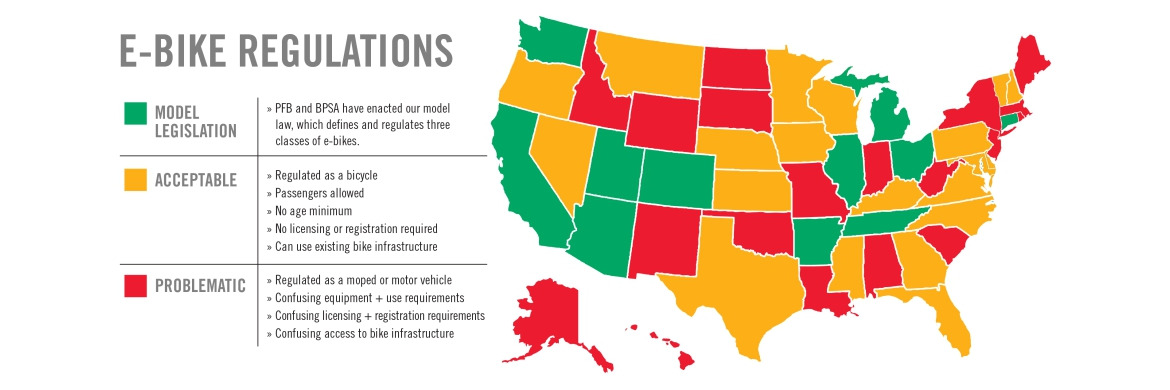E-Bike Bills in Indiana 2019 Legislative Session - Talking Points
E-Bike Legislation in Indiana 2019 Legislative Session
Click HERE to Download Indiana E-bike Talking Points as a handout for Indiana state legislators (2-page PDF)There are two bills (SB 361 and HB 1236) in the Indiana Legislature that are related to electric bicycles (also known as “e-bikes” or “pedal-assist bikes”).
Why E-Bike Legislation is needed:
- The current law related to e-bikes is outdated and confusing.
- Low speed e-bikes should be regulated similarly to traditional bicycles, as they are in 11 states and counting.
- Consumers and retailers need clear definitions regarding Indiana’s e-bike laws.
- E-bikes provide many benefits to the public and need better access to bicycle infrastructure.

Benefits of Electric Bicycles
With an E-bike, bicyclists can ride more often, farther, and for more trips. Electric bicycles are designed to be as safe as traditional bicycles and do not compromise consumer safety. E-bikes benefit bicyclists who may be discouraged from riding a traditional bicycle due to physical fitness, age, disability or convenience.
Who Rides E-bikes?
All types of people purchase and use e-bikes, especially older, baby-boomer purchasers, parents who want to carry children as passengers and cargo, and “urban dwellers” who prefer the purchase of an e-bike over a car.
Approximately 260,000 e-bikes are sold annually in the US. It is a fast-growing segment of bicycle sales, with approximately 75% year over year growth.
The two e-bike bills (SB 361 and HB 1236) in the 2019 Indiana State Legislature Session:
Give direction on new technology to consumers and retailers
E-bikes are not subject to the registration, licensing, or insurance requirements that apply to motor vehicles.
Define e-bike classification
Class 1: Bicycle equipped with a motor that provides assistance only when the rider is pedaling, and that ceases to provide assistance when the e-bike reaches 20 mph.
Class 2: Bicycle equipped with a throttle-actuated motor, that ceases to provide assistance with the e-bike reaches 20 mph.
Class 3: Bicycle Equipped with a motor that provides assistance only when the rider is pedaling, and that ceases to provide assistance when the e-bike reaches 28 mph.
Clarify where e-bike can be ridden
The same rules of the road apply to both e-bikes and human-powered bicycles when it comes to speed, proper passing, local traffic laws, speed limits, equipment and other ordinances.
E-bikes can be ridden on roadways and and bicycle lanes and allows a local authority or state agency with jurisdiction over a trail, bicycle path, or multipurpose path to regulate the use of electric bicycles on a trail, bicycle path, or multipurpose path subject to the local authority's or state agency's jurisdiction.
Specify who can ride e-bikes
Prohibits anyone under age 15 to ride Class 3 e-bikes. Persons less than 15 years of age may ride as a passenger on a Class 3 electric if the Class 3 electric bicycle is designed to accommodate a passenger. Requires use of a helmet by any person less than 18 years of age who operates or rides as a passenger on a Class 3 electric bicycle.
Additional resource: https://peopleforbikes.org/e-bikes/
How you can help:
Contact your Indiana state legislator and ask them to support the bills and even sign on as a co-sponsor. Contact can be by phone call, email or in-person on Bicycle Indiana Statehouse Day (Jan. 31, 2019, 7:30 - 10:30 am, 2nd floor Atrium of the Indiana State Capitol Building)
If your legislator is on the committee the bills has been referred to, ask them to request that the bill be scheduled for a hearing.
Indiana Senate Committee on Homeland Security and Transportation
Indiana House Roads and Transportation Committee
Look for updates on when votes will be held and let your legislator know. You can follow the bills online - search for the bill by its number, name, or “bicycle” keyword and then click on “Bill Actions” to see its progress.
Thank your legislator for their time and especially if they took positive actions toward getting the bills passed. There may be other opportunities that they can assist with legislation in the future.
Invite them for a bike ride when the weather is warmer. It’s always beneficial to get people out on bikes and communicate with your state legislators outside of session. If you are an e-bike owner, invite them on an e-bike ride!
